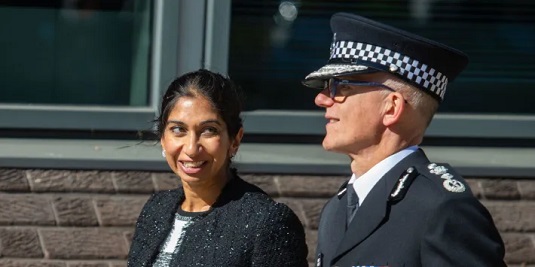
Leaked documents that made their way into Sunday's Observer showed how civil servants working under Gove's direction are looking to broaden the definition of "extremist" to anyone deemed to undermine the UK and UK institutions. The definition reads "Extremism is the promotion or advancement of any ideology which aims to overturn or undermine the UK’s system of parliamentary democracy, its institutions and values." This is so broad that 'extremism' could range from the advocacy of electoral reform to calls for abolishing the monarchy to the replacement of parliament by direct and participatory democracy. No one has had the chance to scuttle out to defend the expanded definition yet, but if they ever do they'll rule out it being used against "respectable" organisations and "decent citizens". Laughably, we're expected to take this government on its word. And should Gove see it through what are the chances of it getting vetoed by a Keir Starmer-led Labour government? Somewhere south of zero I'd wager.
This all adds to the atmosphere of drum banging authoritarianism since the Palestine solidarity movement threw the political establishment into a panic. The government's framing of the 7th October Hamas attack as some sort of year zero event, the official mourning the Tories and Labour colluded to enforce, the apologism for war crimes, and outright lying about protesters' character and intentions are not working. Even repeating the position in fluffier language, incorporating real concerns and taking a hand wringing approach hasn't convinced. And so as the rhetoric isn't demobilising anyone, they turn to the authoritarianism.
But there has been a curious reticence about it. Never one to mince her words, Suella Braverman is choosing her steps very carefully. She has straight up called the protests of the last few weeks "hate marches". Yet, if they really were hate marches and an occasion for anti-Jewish racism why has she not banned them? Instead, we're treated to a grim tete a tete where Braverman says she would look very favourably on any police application to stop demonstrations, while the Met Commissioner pleads ignorance about what a hate march is. Then we have her and other ministers arbitrarily designating "remembrance weekend" as something sacred and demand the police stop the desecration of the Cenotaph, when this Saturday's march starts well after the minute's silence and goes nowhere near it. And then earlier today the Met issued a request to postpone the demonstration. To which the organisers have said no. It's seems to be too hot an issue for anyone to handle.
Could the rumoured but seldom seen conservative conscience be kicking in? A case of not even Braverman or the cops wanting to be held responsible for an unwarranted attacked on liberty and freedom? Or, as is more likely, they haven't burned out all traces of political sense and realise that hundreds of thousands could well defy a ban anyway, leading to open defiance, ugly scenes, and the generalisation of a solidarity movement into something that calls into question wider issues: the authoritarian state, policing, the cosy establishment consensus. The growth and spread of Palestinian solidarity has shown the powers that be that, despite their hopes, not only is the left much stronger than Starmer's disposal of Corbynism suggested but that politics as a whole remains febrile. Authoritarianism is a reflex when the state is caught on the hop, but exercising it with relish could lead to all kinds of unforeseen consequences. The government are politically clueless, but they're not so far gone that they don't know when a crisis of legitimation could become a real possibility. And it's this that is staying their hand, for now.
Image Credit
4 comments:
Hi Phil, I would like to challenge your view that it is "the left" mobilising these marches. It's actually the Palestine Solidarity Campaign (of which I am a member) and while many of the participants, and members, might be left wing, by no means all are. Many quakers, and other church and religious groups are supporting it, including a number of Jewish groups. These are people who care about justice, and human rights, fairness and compassion - all values which are not the sole property of any particular sector of the political spectrum.
As a Buddhist I don't see myself as anywhere on the left-right spectrum, but rather someone who tries to practice the noble eight fold path, of right speech, right action, right understanding, right livelihood, right mindfulness, right intention, right concentration and right effort. The fact that this mostly more aligns with progressive values, which tend to be more to the left, is worth noting, but not definitive, nor would I wish such a label to be applied.
Imagine if the Labour Party was led by a human rights lawyer - we would have a clear defence of the right to march and an unequivocal statement on the importance of free speech in a democracy
... something along the lines of the statement by the Western Front Association who are organising a comemoration on the 11th at the Cenotaph;
“I think a lot of people are trying to whip this up, The police are not going to let anyone near the Cenotaph. We are a democratic organisation that commemorates those who fought for democracy, so free speech is important.”
From MedicalXpress
“ The study, led by the Glasgow Centre for Population Health (GCPH) and the University of Glasgow, and published in the Journal of Epidemiology and Community Health, reports that compared to what previous trends predicted, an additional 335,000 deaths were observed across Scotland, England and Wales between 2012 and 2019.
Statistical analyses demonstrate that previously improving mortality trends changed around 2011-2013 in both Scotland and England (following the implementation of austerity policies in 2010).”
So there we are; a similar figure is given by the Glasgow University study, Dec 2022.
Post a Comment